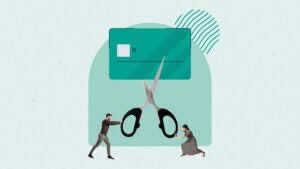Zombie debt: What it is and how it works

Key takeaways
- Zombie debt refers to old or expired debts you’ve either forgotten about or never knew about that debt collectors try to resurrect and collect.
- The most common types of zombie debt include discharged or settled debts, time-barred debt (debt that is past the statute of limitations for collecting), accounts that have fallen off your credit reports and debt that doesn’t belong to you.
- To best protect yourself, research the debt and request a debt validation letter.
- Check your state’s laws to research your rights against zombie debt, including statute of limitations laws, so you do not accidentally reactivate expired debt.
Zombie debt can feel like it rises from the grave, appearing out of nowhere to haunt your credit report or financial situation. But what exactly is zombie debt, and why does it show up when you least expect it?
The term “zombie debt” refers to old or expired debts that debt collectors try to revive and collect, often after years of inactivity. Understanding how zombie debt works and how to protect yourself from aggressive collection tactics can help you avoid financial stress and stay in control of your credit.
What is zombie debt?
Zombie debts are old, forgotten or time-barred debts that resurface after a long period of inactivity. These debts may have been written off, settled or even passed the statute of limitations for legal collection.
However, third-party debt collectors often purchase these old debts for a fraction of their original value and attempt to collect them from consumers. The term “zombie” reflects the idea that these debts, like zombies, are “revived” and come back to haunt people who may have long since moved on.
Zombie debt can include unpaid credit card bills, personal loans, medical debt or utility bills and often arises when collectors or collection agencies attempt to persuade people they still owe the debt. Individuals are often unaware that they are no longer legally obligated to pay some of these debts.
Debt collectors use aggressive or misleading tactics to collect on zombie debts. What’s worse, if a consumer acknowledges or makes a payment, it can restart the statute of limitations, giving collectors a legal foothold to sue for the debt. Understanding what zombie debt is and how it operates is crucial to protect yourself from falling into unnecessary financial trouble.
How zombie debt works
Although debt collectors can’t take you to court to collect on zombie debts because those debts are usually past the statute of limitations, they may be allowed to contact you to collect the money. Because the cost to purchase expired debt is often low — sometimes pennies per dollar — zombie debt collectors can earn decent profits when consumers agree to repay old debt. Unless your state requires a debt collector to disclose that it can’t sue you to collect the amount owed, you might inadvertently take actions that revive the debt.
For example, if you pay an expired loan in part or in full or even acknowledge that it’s yours, this could reset the clock on the debt. That means the collector can sue you or report the debt to the credit bureaus, depending on the collection laws in your state.
Common types of zombie debt
Some types of debts are more likely to become zombie debt than others. Common examples include:
- Credit card debt: Unpaid balances that have been sold to third-party collectors
- Medical debt: Bills that went unpaid years ago but were never properly settled
- Personal loans: Old, unpaid personal loans from banks or other financial institutions
- Utility bills: Charges for past services like electricity or phone bills that were forgotten or unpaid
- Expired judgments: Court-ordered debts from lawsuits that have passed their statute of limitations
- Old store cards or department store credit: Store-specific credit cards with balances that were never paid
These debts may be legally unenforceable if the statute of limitations has passed, but collectors may still attempt to collect them.
Tricky zombie debt collection tactics
Debt collectors often use aggressive tactics to trick consumers into paying zombie debt. Knowing what to look for can help you avoid falling victim to these practices:
- Misleading communication: Collectors might suggest you are still legally obligated to pay the debt, even if it’s past the statute of limitations.
- Frequent calls and letters: Persistent contact can pressure you into making payments. However, once a debt is time-barred, the collector cannot legally sue you.
- Offers to settle: Collectors may offer a deal to let you pay a portion of the debt. Even a small payment can restart the statute of limitations, giving them the legal right to sue.
- Threats of legal action: Some collectors may falsely threaten to take you to court, even though they cannot legally do so, to scare you into paying.
- Debt reporting: Collectors may attempt to report zombie debt to credit bureaus, which can damage your credit score.
Understanding these tactics can help you avoid accidentally reactivating old debts and protect your credit health.
How to protect yourself from zombie debt
Protecting yourself from zombie debt is all about knowing the law and doing your research. If you are clear on what is allowed, you can easily see when someone is trying to scam you. Follow these steps to keep debt scavengers at bay.
1. Research the debt
Figure out who was owed and who was responsible for the debt. It’s possible that you are being charged with a debt that simply isn’t yours. If the charge seems unfamiliar and you don’t have a record of it, you may have been contacted by mistake.
2. Request a debt validation letter
If you’re unsure whether the debt belongs to you, ask the creditor for a validation notice verifying how much the debt is worth, who the original creditor was and when the debt was incurred. Check this against your records to confirm whether the debt is yours. If not, you can send a dispute letter to the creditor.
3. Determine your next action
If you paid the debt, send a dispute letter to the creditor if the debt has been paid. The debt collector will need to send proof that the debt is yours to validate it, but likely they will leave you alone because they don’t have proof. Additionally, if the debt is listed on your credit report, dispute it directly with the three major credit bureaus: TransUnion, Experian and Equifax.
If the debt is not yours or is invalid, you will want to take similar steps. Ask the debt collector to send verification of the debt. If they continue contacting you, you can send a letter asking them to stop.
If you owe and can pay, be sure you understand your rights through the Fair Debt Collection Practices Act (FDCPA). With a debt still listed, consider negotiating with your creditor to settle for less than you owe. Get the collector to agree in writing that it can’t sue you to collect the remaining amount. Pay your debt as soon as possible and check to see how it may have impacted your credit.
You can view your credit reports for free at AnnualCreditReport.com. You can view one free report from the three major credit bureaus each week.
If you owe and can’t pay, consider all your options. You might be able to negotiate a lower payment or payment plan with the debt collector. You can also consider withholding payment until you are able. However, this may hurt your credit score. If payment isn’t an option, you might want to file for bankruptcy, which can free you of the responsibility for your debts.
No matter what you decide to do, keep a written record of all correspondence with the debt collector. This way, you have evidence should you need to pursue legal action.
4. Tell the debt collector to stop contacting you
Under the Fair Debt Collection Practices Act, you have the right to tell a zombie debt collector not to contact you. The FTC recommends that you send the collector a certified letter with a return receipt to confirm it has been received. If you need help creating a letter, the Consumer Financial Protection Bureau (CFPB) has sample letters on its website.
If a zombie-debt collector violates the FDCPA by harassing or threatening to sue you, file a complaint with the CFPB and report the violation to your state’s attorney general office.
5. Don’t share any information or admit to the debt
If the zombie debt isn’t listed on your credit report, it may be best not to acknowledge it or make any payments. Remember that you’ll be legally responsible for the debt in some states if you take one of those actions.
6. Get help from a financial professional
If you feel overwhelmed by debt collectors or unsure about how to handle zombie debt, a financial advisor or attorney can help you navigate the process and protect your rights.
“Collection companies can be really aggressive in how they approach people, and sometimes, they even come across as threatening,” says Joe Camberato, CEO of NationalBusinessCapital.com. “A legal advisor can help you understand your options and make informed decisions instead of trying to figure it all out on your own. There’s so much misinformation out there, and every situation is unique. When you spend the money to consult with someone who specializes in debt, that can save you a lot of stress and potentially help you find the best solution.”
The bottom line
Zombie debt can be a frustrating and confusing experience — especially when it comes back to haunt you years after you’ve moved on. Knowing how zombie debt works, recognizing common collection tactics and taking steps to protect yourself can help you avoid falling victim to these collector tactics.
Stay informed, monitor your credit and don’t hesitate to seek professional help if needed. By staying proactive, you can keep zombie debt from disrupting your financial life.
Frequently asked questions
Why we ask for feedback Your feedback helps us improve our content and services. It takes less than a minute to complete.
Your responses are anonymous and will only be used for improving our website.






